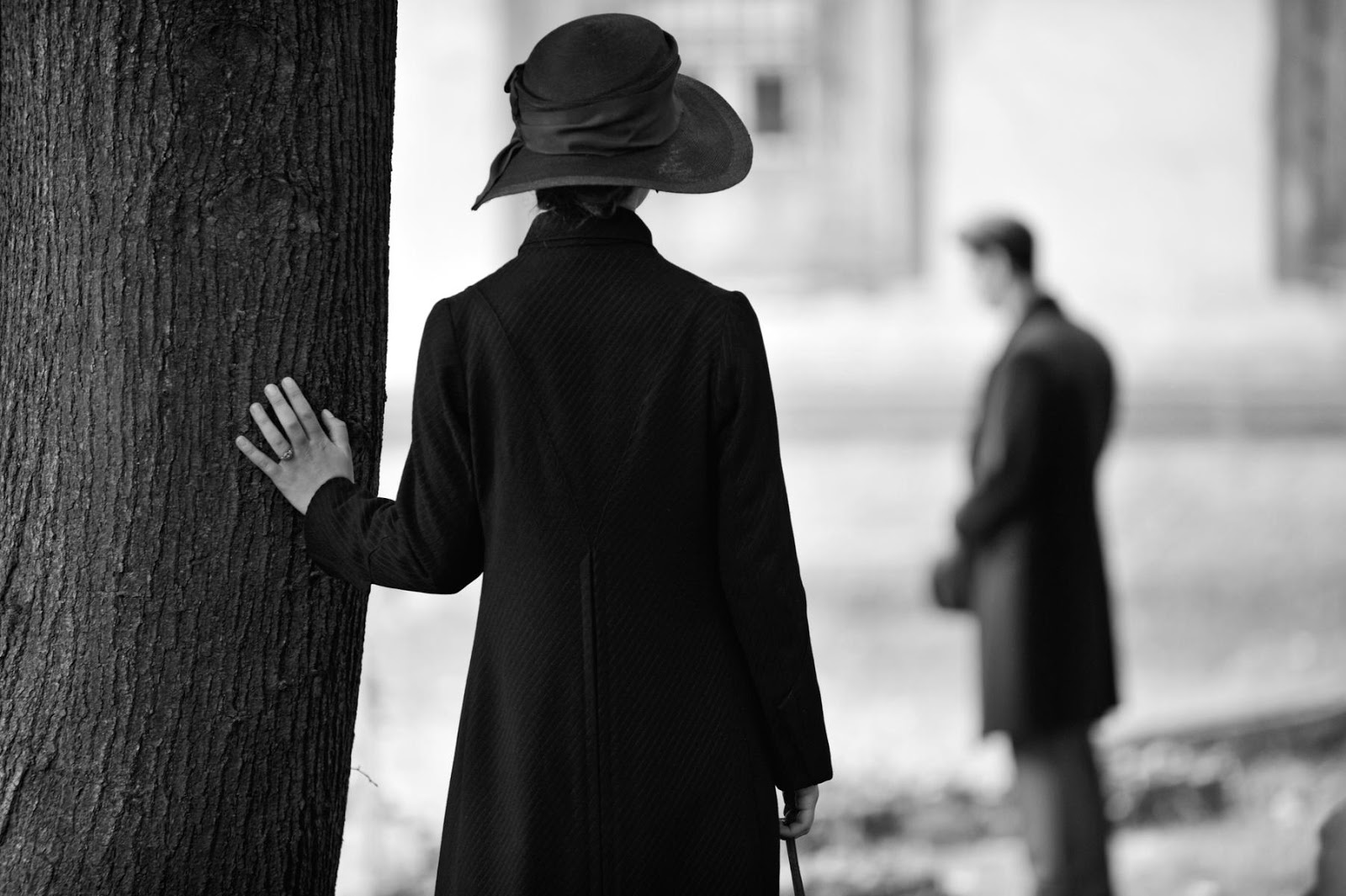
 Shot in mostly black and white, veteran French filmmaker Francois
Ozon's (The New Girlfriend,
Swimming Pool) expansive remake of a lesser-known Ernst Lubitsch romantic
anti-war work from 1932, Broken Lullaby
(itself, based on a play by Maurice Rostand), finds chances to
use color in some choice places within its story. It's used for
effect, as the drab and colorless events brighten up with vivid color
when elements of the story fill in with hopefulness, especially as
captured classically, and quite sumptuously, by cinematographer Pascal
Marti, especially with a certain touch of stark and shadowy German
expressionism.
Shot in mostly black and white, veteran French filmmaker Francois
Ozon's (The New Girlfriend,
Swimming Pool) expansive remake of a lesser-known Ernst Lubitsch romantic
anti-war work from 1932, Broken Lullaby
(itself, based on a play by Maurice Rostand), finds chances to
use color in some choice places within its story. It's used for
effect, as the drab and colorless events brighten up with vivid color
when elements of the story fill in with hopefulness, especially as
captured classically, and quite sumptuously, by cinematographer Pascal
Marti, especially with a certain touch of stark and shadowy German
expressionism.
Frantz is set in Quedlinburg, Germany, in 1919, just after the Great War (World
War I) has concluded, though the aftermath is still quite fresh in the
hearts and minds of the people. A local woman named Anna (Beer,
The Dark Valley) is but
one of many who are mourning for the loss of young men in the war,
grieving her beloved Frantz (Von Lucke), killed in battle before he would return and marry her as
planned. Living under the roof of Frantz's parents, Dr. Hans Hoffmeister
(Stotzner, Underground) and his wife Magda (Gruber,
The Lives of Others), Anna regularly places flowers on
Frantz's vacant gravesite, only to discover a mystery man has already
come to do the same.
It turns out that the man is someone
who fought on the side of the enemy, a Frenchman, who later visits the Hoffmeisters and finds an icy reception, just like most of the rest of
the nationalist town against those who hail from a country who killed
many of their own. Adrien Rivioire (Niney, Yves Saint
Laurent), the Frenchman in question,
nevertheless, persists, eventually speaking to Anna, then her late
fiancée's family, about how he knew Frantz well in Paris before the
war, and all of the memories they shared.
From there, the story takes paths too interesting and revelatory to be
divulged in the synopsis, including the nature of why Adrien is so
distraught about the passing of Frantz in particular. Themes about truth,
half-truths, secrets, and lies meant to shield others from further
harm permate the rest of the story from various angles. Ultimately, it
puts into question the nature and cost of wars and political
divisions, finding more love and common ground among enemies than in
the chasms driven by government decisions that stokes hysteria among
the citizens, whether in a small town in Germany or the most populous
city in France.
Very nicely performed by the leads, Beer and Niney, who both have to
act in bilingual fashion between French and German dialogue, as well
as deliver good chemistry, both as angst-filled strangers and
mourners, as well as two people who find an unstated connection that
surprises them both. While different in story and scope from
Ozon's previous works, there are still his signature psychological
themes, such as his understated exploration of sexual hunger and
fragile romantic desire in complicated situations, with requisite
homoerotic subtexts.
In this day and age when such nationalist policies are taking hold in
countries who used to embrace immigrants for their diversity and hard
work ethic, the old-fashioned story seems to be ready-made for today's
politically charged environment. It's no surprise that those who
are engaging in the decisions to go to war are the very people who'll
never have to look their enemies in the eye, willing to sacrifice the
sons of others in order to resolve disputes they haven't the tact or
patience to do through peaceful means. One enlightened character
within the film even suggests that soldiers who fight on the opposing
side aren't who killed their sons; it was they, themselves, who sent
their sons to war that resulted in tragedy.
Ozon's film would go on to be rewarded with eleven Cesar Award
nominations, including Best Film. Given Ozon's reputation as an
auteur, as well as the political subtext one can read into the film's
pessimistic look at putting country above all else, one can see why it
might resonate within a European Union that is threatening to unravel.
Though is a bit slow in delivery, and contains a couple of reveals
that you may be likely to be suspecting from the outset (though Ozon
suggests other interesting avenues), as a psychological study of what
people feel they must do in order to protect others from grief,
including themselves, it's an often fascinating observational work,
especially in the context of the turmoil some feel that the world is
headed in through the current trend toward isolationism among
neighboring countries, with whom they'll likely form the prejudices of
ignorance all over again.
Qwipster's rating:







©2017 Vince Leo

 Shot in mostly black and white, veteran French filmmaker Francois
Ozon's (
Shot in mostly black and white, veteran French filmmaker Francois
Ozon's (